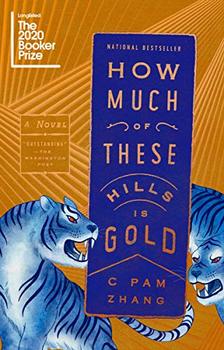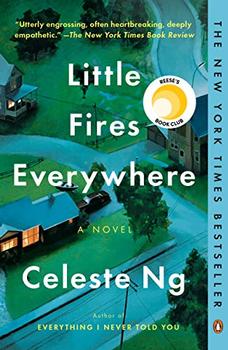Summary | Excerpt | Reviews | Beyond the book | Read-Alikes | Genres & Themes | Author Bio

A Novel
by Catherine ChungIntrospective and affecting, Catherine Chung's The Tenth Muse charts one Chinese-American woman's fraught attempt to succeed in a field dominated by sexism and racism. Taking place over the course of the second half of the 20th century, the story follows Katherine from birth to adulthood as she discovers a love for mathematics and struggles to find her place in a lineage of female mathematicians. While it faithfully conforms to the conventions of literary realism, Chung's gift for compelling storytelling makes the work feel memorable and imaginative.
The novel opens with an elderly Katherine reflecting on her childhood spent in the small town of New Umbria, Michigan during the 1950s. As the precocious daughter of a Jewish father and Chinese mother living in a conservative area, she reflects, "I never really fit in." She has few friends as a child, and her parents are emotionally distant; her veteran father and immigrant mother refuse to speak about their heritages or pasts. These early chapters portray the young Katherine as a lonesome outsider who relentlessly seeks solace in her studies, neatly establishing the trajectory of her character arc.
The plot becomes more mysterious when Katherine's mother inexplicably abandons the family. The summer before Katherine enters tenth grade, her mother "packed up and went, taking only our car, without warning." When her father becomes engaged to another woman six months later, the teen takes to spending long afternoons in the library, where she represses her fury by studying "with single-minded purpose." Still, the secret behind her parents' strange relationship and rift haunts Katherine long after she's accepted into the college of her choice, Purdue University.
At Purdue, she excels at mathematics but faces great adversity. "A handsome, neatly dressed" white classmate named Blake, "the ultimate insider," befriends the heroine only to surreptitiously copy her problem sets for a challenging class. When the professor notices and confronts the pair, Blake accuses Katherine of cheating, and is believed. Disrespected and undervalued, she yearns for "a sense of belonging."
Again and again Katherine comes into close contact with misogynist, racist men who treat her presence in academia with suspicion and condescension. "How are they so sure of themselves," she wonders of the many mediocre but boisterous men she meets, "and why are so many people so eager to listen [to them]?" Across all the novel's 31 fast-paced chapters, Chung lends a lifelike voice to the frustrations of a fictional female trailblazer.
The protagonist's problems continue well into her graduate studies at MIT, where she tries to prove the infamous Riemann Hypothesis, which claims that the distribution of prime numbers follows a predictable pattern. At MIT, she begins a fraught long-term romance with Peter, a "fundamentally social" professor who becomes her thesis advisor. Initially idyllic, the relationship transforms into a toxic power struggle between two brilliant but diametrically opposed minds.
Proving one of mathematics' most enigmatic hypotheses; uncovering the mystery of her mother's identity and disappearance; contending with rampant racial and gender bias; finding a promising career threatened by a powerful partner's insecurities. At the novel's midpoint these are the problems Chung has set up for Katherine to solve.
Curiously, after her father confesses a slew of family secrets following a heart attack, Katherine embarks upon a fellowship to Germany that offers the key to unlocking both the Riemann Hypothesis and the mysteries of her parents' pasts. The largely realistic story takes several sudden turns, but each follows logically from what precedes it. The author's firm belief in cause-and-effect, in the orderliness of life and history, lends the novel a sense of serenity, in spite of the fast-moving plot.
Skillfully interwoven with the story of Katherine's life are those of her predecessors and peers. Whenever she faces challenges to her intelligence, Katherine remembers the accomplishments of women mathematicians like Emmy Noether, Sofia Kovalevskaya and Hypatia. These women motivate her, lessening her isolation, and their inclusion in the narrative broadens the scope of the novel to encompass a global tradition of female excellence in mathematics (see Beyond the Book). The reflections are so frequent, even readers unfamiliar with these women will know their biographies well by the novel's end.
Other kinds of digressions also add an inventive twist to the storytelling. "I should warn you that I tell a story like a woman: looping into myself, interrupting," Katherine declares early in the novel. Along with miniature biographies of women mathematicians, feminist fairy tales and myths interrupt the flow of the protagonist's straightforward story of struggle and accomplishment. The short tales add a taste of the fantastical to a novel that's often bleak and reflective.
The Tenth Muse begins with Katherine's blunt recognition that her "reputation is on the rise," after decades of social humiliation and ongoing marginalization. What follows is an absorbing life story of pain, perseverance and triumph that establishes Chung as an accomplished writer of historical fiction.
![]() This review was originally published in The BookBrowse Review in May 2019, and has been updated for the
May 2020 edition.
Click here to go to this issue.
This review was originally published in The BookBrowse Review in May 2019, and has been updated for the
May 2020 edition.
Click here to go to this issue.

If you liked The Tenth Muse, try these:

How Much of These Hills Is Gold
by C Pam Zhang
Published 2021
An electric debut novel set against the twilight of the American gold rush, two siblings are on the run in an unforgiving landscape - trying not just to survive but to find a home.

by Celeste Ng
Published 2019
Winner of the 2017 BookBrowse Fiction Award
From the bestselling author of Everything I Never Told You, a riveting novel that traces the intertwined fates of the picture-perfect Richardson family and the enigmatic mother and daughter who upend their lives.
Your guide toexceptional books
BookBrowse seeks out and recommends the best in contemporary fiction and nonfiction—books that not only engage and entertain but also deepen our understanding of ourselves and the world around us.